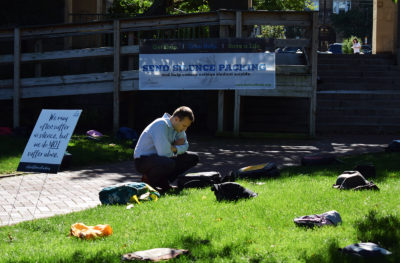
The Supreme Judicial Court of Massachusetts heard a case on Tuesday that will determine whether or not colleges should be held responsible if one of its students commits suicide. Boston University is among the 19 Massachusetts colleges and universities that are backing the defendant, the Massachusetts Institute of Technology, in the lawsuit.
The case, Dzung Duy Nguyen v. Massachusetts Institute of Technology, was filed by the family of late MIT doctoral candidate Han Nguyen, who committed suicide in 2009. The Nguyen family claims in the lawsuit that MIT knew Han Nguyen was at risk of suicide and did nothing to prevent it, according to Reuters.
BU filed an amicus brief in support of MIT’s position, according to BU spokesperson Colin Riley. Riley and the Boston University Police Department declined to comment further.
In the brief, BU and other Massachusetts universities are urging the court to grant summary judgment to the defendants on the basis that preventing an individual’s suicide is not a responsibility that should be left to an educational institution.
“Non-clinician third parties have no duty to prevent a person from committing suicide or otherwise harming herself, except in certain limited circumstances not present here,” the brief stated.
The supporting universities further argued that there is no special relationship between universities and students that would oblige universities to constantly monitor students’ health, and that the requirement for non-clinician university employees to save or help suicidal students could be risky and incur negative repercussions.
“Plaintiff’s position would unreasonably require non-clinician employees to exercise judgment on matters for which they do not have the requisite education, expertise, or training,” according to the brief. “The imposition of [such] a duty could have a chilling effect on students with mental health conditions and other concerns.”
Deborah Carr, a sociology professor at BU, said she understands the perspective of the Nguyen family in the lawsuit given their circumstances, but she supports the universities’ stance in the court case because every suicide case is so unique.
“All suicides are different,” Carr said. “We know that almost all suicides are preceded by depression, but some students suffer silently. Some belong to groups where depression is stigmatized and so they don’t let out to others that they’re at risk. I think it’s holding universities really to an impossible standard.”
Carr said she believes the lives of students and faculty at universities would be negatively affected, if the lawsuit were to succeed.
“It might lead to surveillance of students in a way that’s uncomfortable for them,” Carr said. “I think it places a burden on faculty members and advisors who might not have formal mental health training to have to diagnose or go beyond their level of training.”
Several BU students agreed that universities shouldn’t be held accountable for student suicides, though that shouldn’t preclude them from offering robust mental health services to students.
Mayuri Nagpal, a freshman in the College of Communication, said she does not think universities should be held responsible for a student committing suicide, but does believe there should be programs in place to deter suicide.
“Universities should try to have programs or something to prevent suicide,” Nagpal said. “For the students without BU health insurance, I think BU should set up more programs throughout the year where students can freely and comfortably talk to people, like doctors or therapists, about any personal issues they’re having without having to pay.”
Varsha Naik, a senior in the College of Fine Arts, said she thinks BU could be doing more to provide adequate mental health services for students who may be depressed or experiencing suicidal thoughts.
“I’ve tried to make an appointment at Behavioral Medicine and it’s always really hard to get appointments — they’re pretty booked out,” Naik said. “I know the services are there, but the amount of people who actually have issues and the amount of services that are available are just at a completely bad ratio.”
Lana Harfouche, a freshman in the College of Arts and Sciences, said she thinks universities should not be held accountable for a student’s suicide because the university might have no way of knowing the student was having suicidal thoughts.
“It could very well be that the person [who committed suicide] has had struggles long before attending the university,” Harfouche said. “Also, unless the person actually asked for help regarding the suicidal thoughts and their internal struggles, the university may not have known of the situation, given it is a very personal thing.”
Andres Picon contributed to the reporting of this article.
























































































































